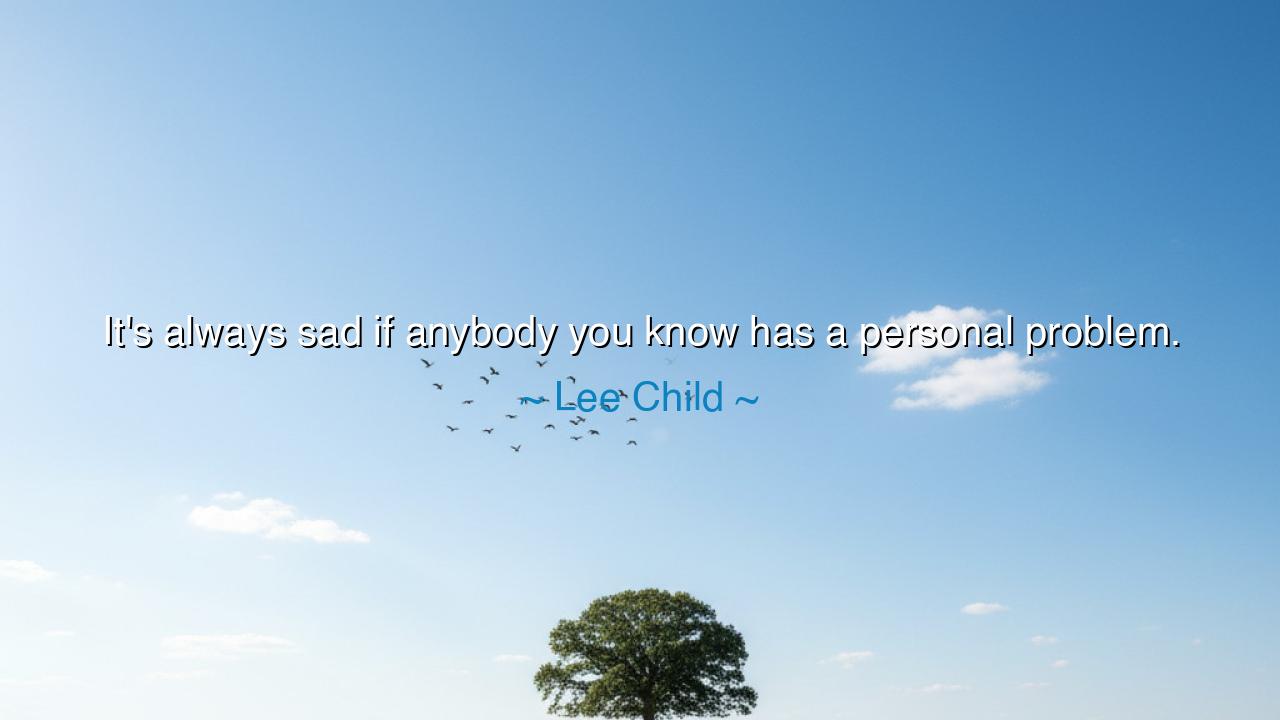
It's always sad if anybody you know has a personal problem.






“It’s always sad if anybody you know has a personal problem.” — so said Lee Child, and in this brief utterance lies a truth as ancient as humanity itself: sorrow is not confined to the one who suffers, but ripples outward to all who are bound in the circle of kinship and friendship. The heart does not live in isolation. When another falters, a part of us falters with them, and in their struggle, we glimpse the fragile threads of our own condition.
The word sad here is gentle, yet it carries a weight deeper than it seems. For sadness is not only grief—it is recognition. It is the acknowledgment that to live is to be vulnerable, and that no one, however strong, escapes the burden of problems. When Lee Child speaks of knowing another’s sorrow, he reveals the ancient principle of empathy: that the pain of the other is never fully theirs alone, but shared in silent communion by those who love them.
Consider the tale of Job, the righteous man of scripture, who was stripped of wealth, children, and health. His friends came to sit with him, not with solutions, but with silence, sharing his suffering. Though they did not fully understand his trial, they bore witness to it. Their presence, imperfect though it was, affirmed this timeless truth: that when a person you know has a problem, the sadness is yours as well. For the bonds between souls are invisible threads that tug at us whenever one is burdened.
The origin of such wisdom is found in the fabric of human survival. Since the dawn of tribes and families, the troubles of one have threatened the whole. To see another in distress is to see the tribe weakened, to see the possibility of loss, and so the heart responds with sorrow. This instinct, far from weakness, is the foundation of community. It is how we learn to carry one another, to share burdens that no single back could bear.
But there is also power in this sadness. For when we acknowledge the problems of others as our own concern, we awaken the courage to act. History remembers Florence Nightingale, who walked the wards of soldiers broken by war. Their pain was not her own, yet she felt its echo so deeply that she redefined the very art of healing. Her greatness was born not from indifference, but from the sadness of knowing others’ suffering and refusing to turn away.
The lesson is clear: do not shield yourself from the sorrow of others, for to feel it is to remember your humanity. When someone close to you struggles, let their problem move you—not into despair, but into compassion. Sadness is not a command to collapse, but a summons to care. The heart that feels is also the heart that heals.
Practical action follows: if you know someone in hardship, do not retreat into silence. Speak, visit, write, or simply sit with them. Offer not only solutions—sometimes none exist—but presence, patience, and kindness. To acknowledge their pain is to remind them they are not alone. And if you yourself suffer, allow others into your shadow, for in sharing the burden you lighten it.
Thus the wisdom of Lee Child’s words endures: when someone you know carries a problem, it is always sad, for their life is interwoven with yours. But sadness is not the end—it is the beginning of solidarity, the call to remember that no soul walks alone. And so, let us be guardians of one another, carrying burdens together until they grow light, and finding in shared sorrow the strength that turns weakness into love.






AAdministratorAdministrator
Welcome, honored guests. Please leave a comment, we will respond soon